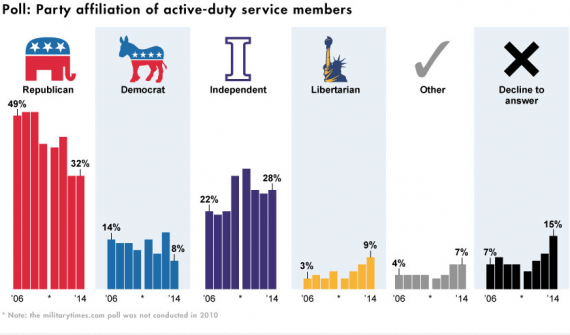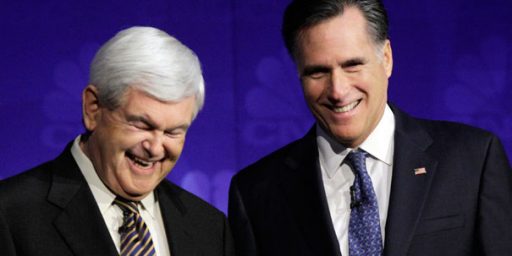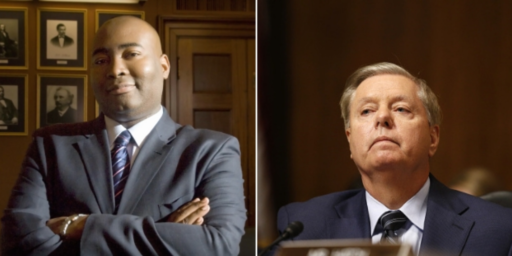Military No Longer Republican Bastion
Always as many military personnel identify as Independents as with the GOP.
Transitioning from a Washington foreign policy think tank to teaching Marine majors fourteen months ago was something of a culture shock. After years surrounded by people with an Acela Corridor establishment outlook, I was suddenly back among people who were much more culturally conservative, who married and had children in their 20s, and who attended church on a regular basis. Yet, while military officers are conservative compared to their Beltway professional counterparts, they’re much less so than they were when I was in uniform twenty-plus years ago.
The polling backs this up. Military Times (a Gannett publication unaffiliated with the US Government) has been surveying active duty military personnel for years and finds them following the same trend as the rest of the country and eschewing identification with either party.
Results of the most recent annual Military Times Poll of more than 2,200 active-duty troops show growing frustration with gridlocked congressional politics, mirroring low approval ratings for national lawmakers in recent polls.
More than one-third of readers who responded to the Military Times Poll said that neither Democrats nor Republicans have been a strong advocate for the military, and 44 percent think both major political parties have become less supportive of military issues in recent years.
Only 12 percent believe both parties have the armed forces’ best interests at heart.
[…]
In the last nine years of the Military Times Poll, the percentage of respondents who consider themselves Republicans has slowly dropped, from nearly half of those surveyed in the late 2000s to just 32 percent this year. Increasingly, readers are more likely to describe themselves as libertarian (7 percent) or independent (28 percent).
Likewise, readers who described themselves as “very conservative” have remained steady over the years, but the “conservative” respondents have dwindled as well — down to 29 percent from a high of 41 percent in 2011.
Democrats and liberal readers make up about 8 percent of the poll respondents.
National polls of veterans have shown a strong preference for Republican candidates over Democratic hopefuls, although not as wide a gap as shown in the Military Times Poll. But they have also shown the same strong affinity for the “independent” label, more so than voters without military experience.
Duke University political science professor Peter Feaver, a former George W. Bush National Security Council adviser, said a rise in popularity for independent and libertarian positions among military members comes as little surprise to him.
“The military follows national trends but lags and skews conservative,” he said. ” ‘The libertarians’ sensibility fits with some of the military’s profile more naturally, particularly the ‘don’t tread on me’ kind of mentality.”
[…]
President Obama gets similar low support from Military Times Poll respondents, with 55 percent disapproving of his performance as commander in chief.
Even support for the tea party was spotty, with just 13 percent of readers saying they back nearly all tea party candidates and 34 percent saying they never back the conservative offshoot.
Despite the mixed feelings about national candidates, military voters in recent years have been more engaged than their civilian peers. According to statistics from the Federal Voting Assistance Program, the number of troops voting in recent presidential elections has stayed around 55 percent, just below national rates, and around 45 percent in midterm elections, about 8 percentage points above civilian rates.
The article cites sequestration and the recent shutdown and round of furloughs as particularly inducing cynicism. There’s a very real sense among officers I talk to that the whole system is simply broken and that politicians care only about getting reelected, not the good of the country. That echoes sentiment in the wider population but is especially critical in military culture, where leaders are expected to put mission ahead of self.
While I get the strong sense that most officers consider President Obama weak and indecisive leader when it comes to military and foreign policy, I think it’s a function of his style and decisions rather than his political party. But the Republicans have lost their traditional edge here. Between the neocon war hawks like John McCain and Lindsey Graham, who want to send our troops to fight endless wars in endless places, and the Tea Party zealots who want to slash budgets without safeguarding the Pentagon budget, the sense that the GOP is the responsible, pro-military party has gone away.







Historically the officer corps has been exceptionally conservative. The enlisted ranks not so much so. I’d love to see a breakdown of their pool by O & E.
Probably being at war for 13 years makes members more jaded about the political parties.
I also agree that what’s broken is congress members are more about keeping their jobs than making good decisions about what’s good for the country. They won’t take political risks because of how it might play in a political ad in the next election cycle.
An important caveat is that Military Times polls are not scientific and generally not representative of the entire military. This poll might be an accurate representation of active-duty subscribers to the “Lifer Times” but that’s about it.
I went to an Ivy League college and an Ivy League law school. Out of my dozen closest friends from school, all of whom went on to become urban professionals, nine of them married and had children in their 20s. There’s nothing particularly “culturally conservative” about it.
Bush certainly cured me of my Republican tendencies.
I always find that sort of statement interesting, given that the Military are the most socialist/collectivist/conformist/whatever organizations in our society. An observation hardly unique to me. There’s an underlying contradiction here that it would be instructive to explore. More, I think, a contradiction in conservatism than in the Military.
What’s always been funny to me is that, though military members have often trended conservative, they live and thrive in what is, hands down, the single most socialist institution in American life.
When you’re in the military, Big Government controls every aspect of your life. It tells you where you’ll live and how long you’ll live there, what clothes you can wear, what job you’re going to do, how long you can cut your hair, whether you can have facial hair or not, and often who you can or can’t have a relationship with or marry. It provides your food, your education, your housing, your healthcare. It protects you from market pressures, from worrying if you’ll get enough hours on the job this week to get paid, from having to meet a payroll, from not having any customers for your goods and services. Everything you spend, everything you earn, is a gift to you from other American taxpayers who actually have to earn their money in a competitive job market. And the ethos of the military is unabashedly communitarian, elevating the good of the many over the needs of the individual.
I suppose, in some sense, the fact that members of the military are so coddled by the government gives them the time, money and freedom to be such big fans of the market….
They conclude sequestration and the shutdown show the whole system and both parties are at fault rather than Republicans because…both sides do it?
Ask these military libertarians if they think that a soldier, sailor or marine should be able to walk away from his unit in the middle of a firefight in the Afghan mountains if he thinks it’s in his own individual best interest. I don’t think they’ll be so libertarian when push comes to shove….
Officers, just like many people, are often very lazy thinkers and don’t have the time, inclination or knowledge to accurately assess what’s really going on, and so reach out for a comforting but false pablum of fake equivalencies.
@Andy: A fair point although the trend lines appear consistent over time.
@Rafer Janders: Perhaps I should have said “early twenties.” I have students in their mid-thirties with 10- and 12-year old children. They get married much younger and have more children than the people I worked with in DC, most of whom were still single at 30.
@gVOR08: I’ve pointed that out to my students many times.
@Rafer Janders: You greatly overstate the dichotomy but there’s an element of truth to it.
@Rafer Janders: Libertarians believe in contracts.
No longer a Republican bastion? Well, those who stated a Democratic Party affiliation = 8%, an indication of grown non-Democratic diversity.
Independent 28% = probably conservatives not happy that GOP has drifted to the left.
Libertarian 9% = those who will be receiving important government benefits for the rest of their lives and who will no doubt favor cutting non-veteran government benefits in the future.
Declined to state = 16%, probably conservative but smart enough to keep out of this.
@James Joyner:
Sure, and contracts anticipate breach.
@James Joyner:
Yes, you should have. That would have made it accurate.
@al-Ameda:
I wouldn’t be so quick with those assessments. My dad served for 23 1/2 years, and is a very reliable Democrat. I served for 24 years, and am a fairly reliable left-leaning Independent. From my personal experience working closely with both the Air Force and Army, I’d say that the military (if you control the demographics by where people grew up/enlisted) is not so far off from the population as a whole as some people (mostly liberals) might imagine. The fact is, a lot of military people come from the south, and south is a Conservative place, so it’s not surprising they would maintain that ideology. But generally speaking, people who grew up with more diverse backgrounds (I was a military brat for instance) tend to fall about where you’d expect on the ideological spectrum.
@Rafer Janders: Well, most of the people I knew in DC weren’t getting married until their early 30s and weren’t having kids until 35 or later.
@James Joyner:
DC must be a particularly self-selecting careerist place, then. As I said above, most of the people I knew, who were largely working as law firm associates, junior investment bankers, consultants, tech industry employees or PhD candidates in places such as NY, LA, Seattle and Boston, were getting married and having kids in their mid to late twenties.
@Todd:
Yep. One of my most liberal friends is a former Marine officer. But he’s from the NYC tri-state area, so he reflects the values of the place he grew up.
@Todd:
I agree – especially since conservative in a military context seems to mean something quite different than conservative in a political and societal context. Most of the military people I know are conservative, but its their own brand of conservatism, and doesn’t jibe well with any party’s – the whole left-right spectrum simply fails to capture it.
Of course, that’s true of the spectrum in general. It also doesn’t map well for engineers, or union members (two groups I know a fair number of people in), many of both groups are in despair of finding a party which is a good fit, because their positions are all over the board (ie fit with Republicans on some issues, Democrats on others).
The whole left-right linear spectrum is highly overrated as a method of classifying political tendency. I know personally I have positions that are definitely considered “right wing” and some that are definitely considered left-wing, and that’s true for most people I know too. Which is why so many people aren’t political – they think the whole party system is a scam, because the ideologies doesn’t correspond to reality (ie most people are all over the map).
@Todd:
Fair enough Todd. I’ve got military family in-laws in my family – the in-law folks are from Texas and Alabama, and my sisters and their families are quite conservative, pretty much as I expected. Not a problem for me, but they do like to needle me about being a CA liberal.
I’ve lived in DC metro for 20 years and many parents here have their first children in mid to late 30s. Not rare to see parents in 50s or even 60s with teenage kids.
@just me: “I also agree that what’s broken is congress members are more about keeping their jobs than making good decisions about what’s good for the country. They won’t take political risks because of how it might play in a political ad in the next election cycle.”
Congress isn’t ‘broken’; the gridlock is the fault of the GOP, pure and simple, and those elites who like that.
@gVOR08: “They conclude sequestration and the shutdown show the whole system and both parties are at fault rather than Republicans because…both sides do it?”
Because they’re Republicans and right-wingers, and facing the fact that the right and the Republican Party are bat-sh*t insane and want to destroy the country is not something that most of them can do.
@Rafer Janders:
Foir Ivy League educated people, the age of first marriage is probably above 30 y/o. When coming graduate/professional school with the cost of living in Boston/NYC/DC there is little reason to marry young. Also, since the average fertility of all white females in the U.S. is around 1.6, I suspect that the average for Ivy League ecucated women is even lower. Anecdotal stories are no replacement for hard data. http://www.theatlantic.com/sexes/archive/2013/03/getting-married-later-is-great-for-college-educated-women/274040/
As was pointed out more than 25 years ago, in the U, S., the people who are in the best situation to raise children have the fewest children while those with the least resources to raise children have the most children. Is it any wonder why the U.S. cannot compete in the global marketplace and why wages are not going up.
@James Joyner: “Well, most of the people I knew in DC weren’t getting married until their early 30s and weren’t having kids until 35 or later.”
It wouldn’t surprise me that most of them were not in a position to do so earlier. When you’re working 80 hours weeks in a series of temporary risky, low-paying staff positions in an expensive place to live,…
@Rafer Janders:
Within limits. An airline pilot can’t quit mid-flight and just parachute out of the plane, leaving the passengers to fend for themselves.
How many of those “Independents” are actually independents? Or are they straight-republican voters who just don’t want to admit they’re Republicans?
Wow. I would never EVER have thought that the age at which one married and then again one’s age at the birth of children would be actively considered as a marker of where one fits in or who one might be ‘really’.
A big sociological picture, sure – I understand. Finding out that information about an individual and using it to ‘place’ that person? Forget it. I don’t do social media and that kind of event is why.
@Stormy Dragon:
Well, sure, he can. But he won’t, because he’s not a monster, but instead a professional who has ethical duties and takes his responsibility to protect the lives of others seriously. It’s that, and not fear of being sued for breach of contract, that keeps him in his seat.
Which was my point, really. A lot of officers who claim libertarianismin theory wouldn’t really be comfortable with putting it in practice. Libertarians don’t draw fire down on themselves so that their buddies can be safely evacuated from a hot LZ.
@Rafer Janders:
Well it’s hard to operate the radio when you have straw-filled gloves for hands.
@Stormy Dragon:
“Well it’s hard to operate the radio when you have straw-filled gloves for hands.”
So, so funny. Nicely done.
@JohnMcC: I’m not making right/wrong judgments or ideological determinations. But, like church-going, the age at which a subgroup tends to marry and have kids is very meaningful in all sorts of ways. Additionally, it was one of the first things that struck me culturally, reminding me of how different my Beltway lifestyle was from what I had been around the first 37 years or so of my life.
@Rafer Janders:
I’m willing to bet he’d never fly again if he broke a contract in such a manner. /s
@Stormy Dragon: It is known that being conservative, Republican and holding traditional values can harm your career. Thus, the rise in “Independents”.
I wonder if it’s occurred anybody else that independants includes people who are actually more conservative than Republicans?